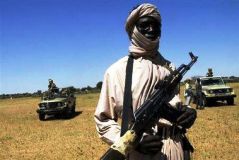Darfur crisis forgotten as “peace” turns to war
Aug 11, 2006 (JUBA) — The government of south Sudan failed to follow strict World Bank procurement procedures on two infrastructure contracts, highlighting its inexperience and the need for oversight, a senior bank official said.
 The former rebels who run the south are desperate to rebuild a region lacking running water, electricity and tarmacked roads after more than 20 years of civil war.
The former rebels who run the south are desperate to rebuild a region lacking running water, electricity and tarmacked roads after more than 20 years of civil war.
With little capacity to deliver basic services to its people, Africa’s youngest regional administration has had to rely on procurement, drawing from a fund comprising its own revenues and donor money.
The World Bank, which manages the multimillion-dollar trust fund, said the southern government had “misprocured” two road contracts for its capital Juba — a move that has raised donor concerns of corruption.
“It simply means all the details of procurement have not been adhered to and this is because of a lack of experience with our rules,” Ishac Diwan, the lender’s country director for Sudan, told Reuters in an interview on Friday.
“Because of political pressure on the government to move fast, contracts were signed without us having a chance to look at all the details,” he said.
“Nobody should assume there was corruption or foul play.”
As Western donors increasingly demand good governance in return for assistance, World Bank President Paul Wolfowitz has targeted graft as a major threat to development and called for transparency in countries that receive aid.
“It’s clear southern Sudan is starting from scratch. It’s important for us to do more hand-holding,” Diwan said.
He was speaking as World Bank Vice President for Africa Gobind Nakani made his first trip to southern Sudan, meeting its leader Salva Kiir. The visit came just weeks after Kiir met Wolfowitz in Washington.
Many southerners complain they have yet to reap the benefits of a peace deal signed with Khartoum last year, putting their leaders under pressure to speed up delivery of services from clinics to schools to roads.
Mindful of the criticism, the World Bank intends to act faster and pin down who is delivering what and when at a donor conference next month, Diwan said.
“We’re putting a bit more emphasis on visible stuff,” he said. “Perhaps we haven’t done that properly in Juba where everybody wants to see a peace dividend.”
(Reuters)
